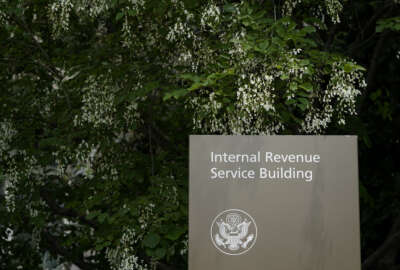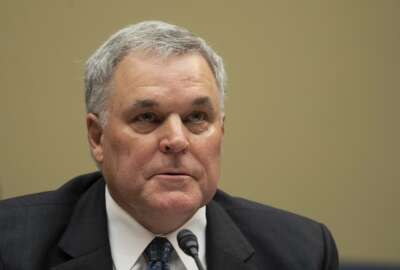
A couple of ideas for how the IRS can plug the so-called tax gap
With the IRS possibly getting big budget boosts in the next few years, the question becomes whether it can hire the people it says it needs … with any reasonable...
Best listening experience is on Chrome, Firefox or Safari. Subscribe to Federal Drive’s daily audio interviews on Apple Podcasts or PodcastOne.
With the IRS possibly getting big budget boosts in the next few years, the question becomes whether it can hire the people it says it needs … with any reasonable speed. A long time federal management expert says a solution is right there in plain sight. American University Key Executive Leadership Program professor Bob Tobias joined Federal Drive with Tom Temin to discuss.
Interview transcript:
Tom Temin: And Bob, hiring of course is a impediment in some ways to every agency because of the federal civil service system, which we treasure for the merit systems that it embodies. But there is other ways to hire people than the standard way. And your argument is? Tell us.
Bob Tobias: Well, Tom, the Internal Revenue Service has the responsibility to collect taxes from the people who owe taxes. And there’s a significant tax compliance gap. And right now, the IRS is currently not up to the task because its workforce has been reduced by 20% over the past few years, and its technology is behind. So, IRS needs to hire the right people and increase its technology capacity. And it can’t I don’t believe do it under the current Title 5 system. So I believe the IRS should be given the same hiring and pay flexibilities as the FIRREA agencies, agencies like the Securities and Exchange Commission, the Consumer Financial Protection Board, and the National Credit Union Administration, who deal with quote, the federal examination of financial forms, close quote. Certainly that applies to the Internal Revenue Service.
Tom Temin: FIRREA, referring to the Financial Institutions Reform Recovery and Enforcement Act, which dates back to 1989. It’s strange that the IRS wasn’t included there in the first place, since it looks at so many, not just individual forms, but the corporate forms.
Bob Tobias: Yes. Yes it is, indeed. I believe they’re eligible and could have been included. And Congress amended the original 1989 act to allow for hiring faster and to pay more to attract that talent Congress felt they needed to duel with the highly paid private sector accountants and attorneys. The IRS is in the same place and could benefit from those flexibilities.
Tom Temin: Yeah, employment flexibilities are numerous in the federal government. I think OPM identifies well more than 100, but also says that the research shows that most agencies use maybe one or two of them, if they even are aware of them in the first place. And so here is a possibility, but sounds like this would take congressional action to give IRS the FIRREA authorities.
Bob Tobias: It would. It would take Congress to consciously give them the same flexibilities as the FIRREA agencies. And they need sophisticated accountants, they need sophisticated technologists, they need sophisticated people to answer the phone promptly and accurately. And they can’t possibly cover the 20% they’re down now plus fill the vacancies from retirees and attract the quality workforce without both the pay flexibilities, of the hiring flexibilities and the ability to pay more.
Tom Temin: Yeah, this seems to be an issue, Bob, that occurs across the government is that the mission creep happens. Agencies get greater and greater roles put on them mostly by Congress, but sometimes by administrations. And then the question of basic capacity comes up.
Bob Tobias: Well, yes. The IRS was tasked with the responsibility of sending out all of the checks to individuals as a result of COVID. So they were right in the middle of the tax season. So they had to stop doing what they were doing and send out the checks, which required an update in their technology, and taking people away from what they normally do to pump out the checks. Now the checks were important, but the Internal Revenue Service was taken off it’s normal job to do something important, but still not it’s normal job. And now, it needs to focus on collecting taxes from the people who owe taxes.
Tom Temin: We’re speaking with Bob Tobias. He’s a professor in the Key Executive Leadership Program at American University. I sometimes wonder if agencies go too far in using flexibilities that are outside of the merit systems hiring, even though those are legally available to them. At what point does the merit system become kind of irrelevant, and we’re back to I like that guy, let’s get him in, or I like her, let’s get her in?
Bob Tobias: So the FIRREA agencies are covered by the basic merit principles. And in all these years, Tom, there’s been no OIG or GAO discovery of doing what it is you just suggested might occur. So I’m pretty confident that using that construct will enable IRS to do what it needs to do without hiring cousins and brothers and sisters.
Tom Temin: I guess this idea of hiring flexibilities could occur across the government. We mentioned the IRS got a lot of extra duties in the various pandemic response of the Congress. Same thing for the Small Business Administration. For that matter, look how much FDA has had to twist and turn. The Centers for Disease and Control Prevention, CDC in Atlanta. A lot of agencies have been just pushed almost to the limit, and the result is a lot of confusing information comes out to the public and a lot of backfilling of holes in programmatic setup we’ve seen over the past year that in some ways makes the government’s competence come into question on the part of the public, and it’s really not the civil servants doing necessarily, they’re evidence of a symptom.
Bob Tobias: Well, the issue of hiring flexibilities is something that’s been around for a long time. And both the National Academy of Public Administration in a recent report to the Office of Personnel Management, and the Office of Personnel Management is saying, we need to address hiring in the federal government. And I think they will. But this is something that needs to happen now, right away, and it’s an easy fix. It only takes a couple of lines in the code to include the IRS and allow it to move forward, and it needs to move forward now.
Tom Temin: I’ve often wondered whether perhaps a model like the National Guard might be needed for civilian agencies. There’s a certain set of a couple of 100,000, a few 100,000 people out there doing their careers that have expertise in some of the matters that agencies deal with, and if there’s some kind of a surge, like Cash for Clunkers or something that comes up, people could be enlisted. Come on join us for a year anyway to get through this hump.
Bob Tobias: Well, that’s kind of an interesting idea, Tom. I suppose the problem with the IRS is that the tax law changes so much and so frequently, the regulations change so frequently, you really have to be a current employee in order to keep up, not only with the changes in the law, but the changes in the way the IRS implements the law. So, the IRS does have a large temporary workforce that comes on during the tax filing season. And they’re trained every single fall and they come on, and they work from usually mid January, depending on workload, till mid June. So these are like permanent, temporary employees, and the IRS gets back in some of these locations, 80 or 85% of these temporary employees, people who want to work only four or five months and they get paid and they’re eligible for health insurance. So the IRS does use this temporary surge hiring in I think a pretty effective way.
Jared Serbu: Bob Tobias is a professor in the Key Executive Leadership Program at American University.
Copyright © 2024 Federal News Network. All rights reserved. This website is not intended for users located within the European Economic Area.
Tom Temin is host of the Federal Drive and has been providing insight on federal technology and management issues for more than 30 years.
Follow @tteminWFED
Related Stories

How the IRS is blazing TRAILS for acquisition professionals




